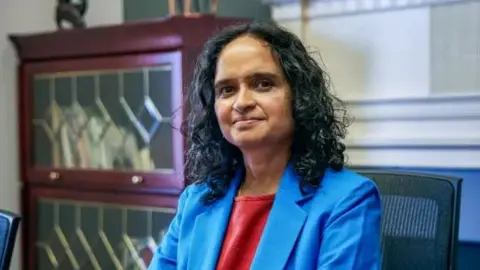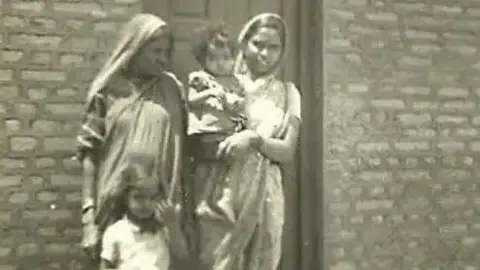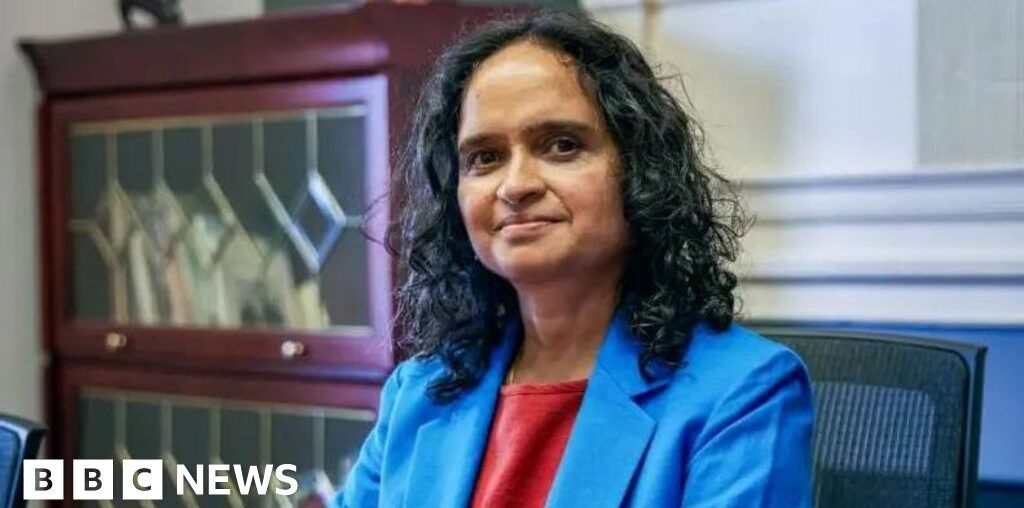 MacArthur Foundation
MacArthur FoundationIn a small, crowded tenement in the slums of India’s Pune city, Shailaja Paik grew up, surrounded by alleys strewn with garbage and battling the daily challenges of limited water and no private toilet.
Today, she stands as one of this year’s 22 recipients of the prestigious MacArthur “genius” fellowship, a testament to a career dedicated to researching the complex lives of Dalit women – those born into the caste considered “untouchable” in India’s hierarchical society.
The MacArthur Foundation’s award – which includes a $800,000 [£615,000] stipend given over five years – isn’t just recognition for her research on caste, gender, and sexuality but a powerful endorsement of her ongoing mission: to redefine the narratives of the oppressed.
Marlies Carruth, director of the MacArthur Fellows Program, says the interdisciplinary award seeks to “enable” people with a track record and the potential to produce additional extraordinary work.
“Through her focus on the multifaceted experiences of Dalit women, Paik elucidates the enduring nature of caste discrimination and the forces that perpetuate untouchability,” the Foundation said while announcing this year’s nominees.
 Sarita Paik
Sarita PaikIn an interview with the BBC, Paik said the fellowship offered immense possibilities for emphasising Dalit issues as human rights issues and “connecting histories of the marginalised in different parts of the world”.
It also plays a role in enhancing “global conversations of social justice”, Paik, who is a professor of history at the University of Cincinnati, added.
“I feel so grateful as an Indian-American woman to be among this group of genius, creative people from the US.”
A modern historian who studies the lives of Dalit women through the lens of caste, gender and sexuality, Paik grew up in India but has been working in the US for more than a decade.
Spending her childhood in a 20x20ft room in Pune’s Yerwada slums, Paik remembered standing in long queues every day to fetch water from the public tap for cooking and cleaning.
“On all levels – social, educational, emotional and mental – all this definitely had a profound effect on me,” she said.
Her younger sister Rohini Waghmare said it was their parents who emphasised the importance of education and ensured all their children studied in English.
“Usually when there are daughters, the mentality is that girls should get married soon,” she said.
Paik was an excellent student throughout school and college.
Her mother Sarita Paik credited her hard work for her success. “I’m less educated but her father and I always felt that girls should learn a lot.”
But studying was a challenge, Paik said. “I remember wrapping myself up in a quilt and telling my family members to speak softly and not make any noise,” she recounted.
“I would go to sleep around 7:30pm until around 3am, then get up to study until 6-7am, before leaving for school.”
 Sarita Paik
Sarita PaikPaik developed a love for history while pursuing her undergraduate degree at the city’s Savitribai Phule Pune University.
“Textbooks then provided merely an overview of different time periods of India, US, Japan or China without any in-depth knowledge about the society or culture.”
As Paik delved more into the subject, she noticed not much work had been done on the education of Dalit women.
“Dalits constitute 17% of India’s total population,” Paik said. “There are statistics but there was no qualitative research. No one had written the history of Dalit women properly, so I decided that I wanted to do this work.”
In 2014, she published her first book, Dalit Women’s Education in Modern India, examining the “double discrimination” of gender and caste they face in accessing basic rights.
“Historically such a large population was not allowed any form of education, public infrastructure, public water bodies or wells, much less the wearing of slippers or new clothes, even if one could afford them.”
Having come from this background, Paik made it the centre of her research and writing.
“Dalit women are undoubtedly the most disadvantaged and oppressed. They are the Dalits among Dalits in terms of gender and politics,” Paik said.
She herself is no stranger to the discrimination and recalls people around her being surprised that she as a Dalit woman had received the Ford Foundation Fellowship for her PhD.
 MacArthur Foundation
MacArthur FoundationPaik’s second book The Vulgarity of Caste : Dalits, Sexuality, and Humanity in Modern India, published by Stanford University Press in 2022, looked at the social and intellectual history of Dalit performance of Tamasha, a popular form of travelling theatre in Maharashtra. The book won the American Historical Association’s John F. Richards Prize for “the most distinguished work of scholarship on South Asia”.
With its significant Indian-American population, caste has become a growing conversation in the US even as India continues to reckon with it.
The historian said that to tackle discrimination, it was crucial for those enjoying advantages of the caste system to acknowledge its existence globally instead of shying away from it.
The discrimination most affects people from “lower castes and outcastes”, Paik said. “So, it is important to engage with those vulnerable and disadvantaged, stand with them in the struggle against discrimination on lines of caste, gender, and race.”
Scholars from marginalised castes face different kinds of roadblocks as they navigate the academic world, one of which is fluency in English language. “Many of them are educated in vernacular mediums and as they move up in the ladders of higher education, they have to work harder than their peers who are fluent in English.”
Such scholars also struggle to access enough financial resources and social networks to tap into resources and connect with renowned scholars. Here, Paik said, it is important for institutions to grant fellowships or have individuals who will fund and support intellectuals pursuing research.
“The picture has changed over the last decade and I am happy that many emerging scholars are aware of varied opportunities and using them to their advantage,” she said.
Paik hopes her MacArthur fellowship will strengthen the fight against casteism “for both Dalits and non-Dalits in South Asia and beyond”.
“I will use the fellowship to continue my research, writing and work with my cohort fellows in creating new opportunities to work for social justice,” she said.
Follow BBC News India on Instagram, YouTube, Twitter, and Facebook.


